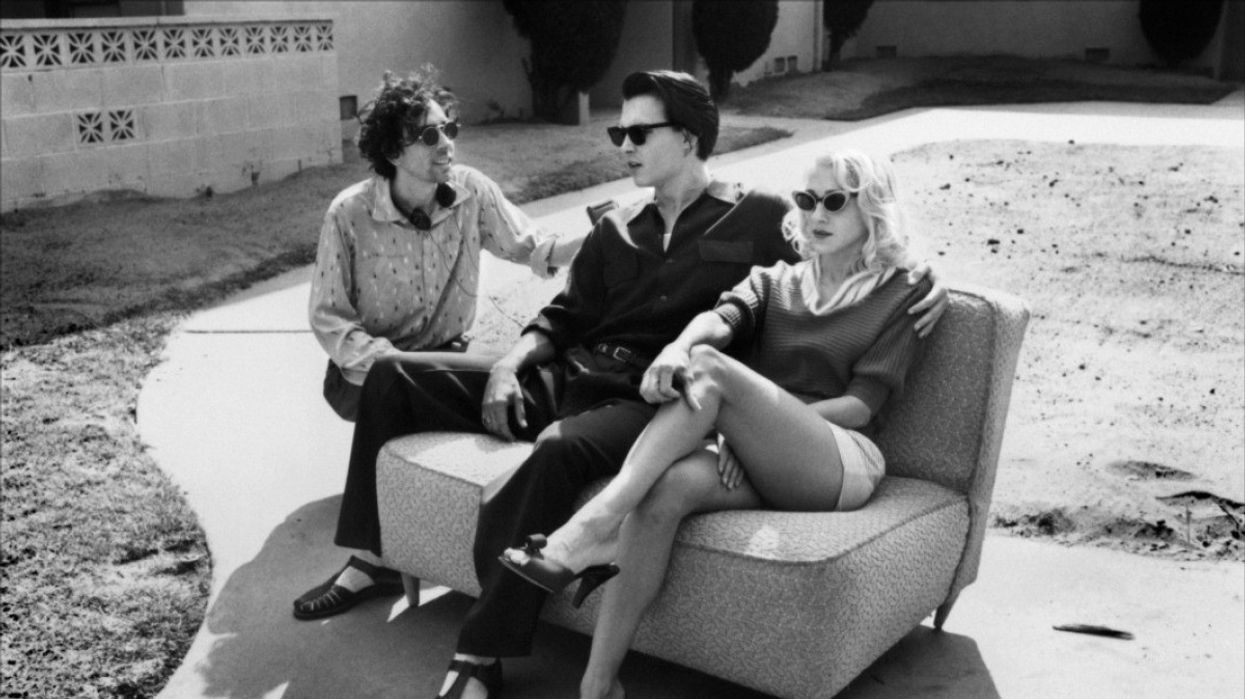When it comes to B-horror/sci-fi flicks, my heart quivers at the thought of watching one. The over the top scenarios, bad acting, and painfully unrealistic special effects put me in a dopamine-induced pleasure coma the likes of which resemble a 2-ton grizzly in the feverish throes of hibernation. Needless to say, the film about the infamous Plan 9 director, Ed Wood, is a film I consider worth studying as well as appreciating for the way the cinematography, acting, and subject matter teeter along the uncanny valley -- it's not quite a chintzy, Ed Wood-esque miscreation, but it bears an eerie resemblance to one. In an interview with Gavin Smith, Tim Burton explores the mediocrity Wood reached inadvertently, yet so entertainingly, and describes how inside every burgeoning filmmaker dwells an Ed Wood whose enthusiasm makes up for lack of talent.
In the interview, Smith explains the relation between Burton's films and the character of Ed Wood the director. He writes:
Burton's films all contemplate in near-sacred terms imagination's attempts to negotiate the mysteries of life, death, and the human need for love that fills the interval between them. Wood is a variant, like The Penguin, Edward Scissorhands, and Beetlejuice, of the irrepressible outsider who will not be denied.
Burton's outcast characters, the aforementioned Beetlejuice, The Penguin, as well as Jack Skellington all demonstrate a dire need to acquire a dream even if those around them know that its futile -- futile not because the task is difficult, but because they lack ability to pull it off. Burton comments on Wood's work:
The films are unusual; I've never seen anything like them, the kind of bad poetry and redundancy-saying in, like, five sentences what it would take most normal people one, which I can also relate to. Yet still there is a sincerity to them that is very unusual, and I always found that somewhat touching; it gives them a surreal, weirdly heartfelt feeling.
Tim Burton's films are all extremely personal and speak volumes about the man who created them. Burton sheds light on what exactly struck him about Wood's story, stating that not only did he (Burton) grow up in Burbank near a cemetery, which is referenced in the film, but Wood exemplifies the kind of character Burton relates to as a storyteller and a person. So really, there's no wonder why Burton would take a shine to the story of Ed Wood:
I was fascinated by the weird perverted optimism because it's something that I started out with and has somewhat eroded, and (Ed Wood) kind of reenergized me. I liked the theme of duality in somebody's nature: like in Batman, the idea of hiding what you have inside. And perception, how you perceive somebody -- I'm interested in that theme. Also the relationship with Bela Lugosi -- I romanticized it from what I read, but I related that to how I felt about Vincent Price.
This theme of "the outsider" also reaches much further than the diagetic space of the film and Burton's imagination. It broadens and bleeds into how Burton relates himself to the Hollywood studio system that he works out of:
I didn't grow up in independent film; from the first, I was in the studio system, and yet I've still been able to do what I wanted to do. So I feel very lucky, but I don't embrace it. I have a resistance to joining the club because I'm just too aware of what can happen to you. I've seen how people are-if you're successful they like you, if you're not, then they don't as much. It's not based on deep emotion.

There is a melancholic kind of appreciation to be felt toward Wood -- a filmmaker whose wide-eyed spirit took him further than his talent ever could -- which wasn't even that far. Because I see a little bit of Ed Wood in myself when I believe that the odds of me being a working filmmaker are anything but impossible and insurmountable. There's a bit of wide-eyed spirit for you.
What do you think about Tim Burton's thoughts on Ed Wood? What interpretations did you see in the film Ed Wood? Let us know in the comments.
Link: Tim Burton interviewed by Gavin Smith -- Minadream.com
[via Cinephilia and Beyond]

















